

NATIONALISM. European Union National Institutes for Culture. History of Europe - 6013 years in 3 minutes. Animaniacs - Yakko's World - HIGH QUALITY. Three little words: Country, Nation, State. Parag Khanna: Mapping the future of countries. Do we live in a borderless world?
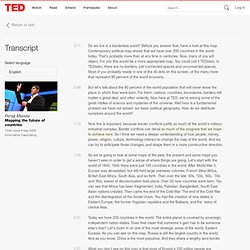
Before you answer that, have a look at this map.Contemporary political map showsthat we have over 200 countries in the world today.That's probably more than at any time in centuries.Now, many of you will object.For you this would be a more appropriate map.You could call it TEDistan.In TEDistan, there are no borders,just connected spaces and unconnected spaces.Most of you probably reside in one of the 40 dotson this screen, of the many morethat represent 90 percent of the world economy. But let's talk about the 90 percent of the world populationthat will never leave the place in which they were born.For them, nations, countries, boundaries, borders still matter a great deal,and often violently.Now here at TED, we're solving some of the greatriddles of science and mysteries of the universe.Well here is a fundamental problem we have not solved:our basic political geography.How do we distribute ourselves around the world? If you add it all up what do you get?
What is a Nation? What is a Nation?
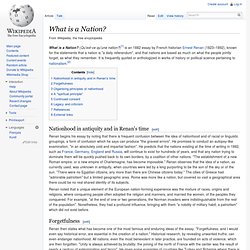
(Qu'est-ce qu'une nation?) [1] is an 1882 essay by French historian Ernest Renan (1823–1892), known for the statements that a nation is "a daily referendum", and that nations are based as much on what the people jointly forget, as what they remember. It is frequently quoted or anthologized in works of history or political science pertaining to nationalism.[2] Nationhood in antiquity and in Renan's time[edit] Renan begins his essay by noting that there is frequent confusion between the idea of nationhood and of racial or linguistic groupings, a form of confusion which he says can produce "the gravest errors".
5. Imagining the Nation — Centre for the Study of Culture and Society. What is a 'Nation'?
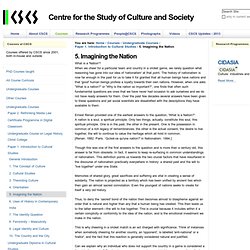
When we cheer for a particular team and country in a cricket game, we rarely question what reasoning has gone into our idea of 'nationalism' at that point. The history of nationalism is now far enough in the past for us to take it for granted that all human beings have nations and that 'good' human beings profess a loyalty towards their own nations. SectionTwo_001.pdf. Nationalism. 1.
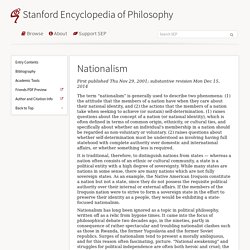
What is a Nation? 1.1 The Basic Concept of Nationalism Although the term “nationalism” has a variety of meanings, it centrally encompasses the two phenomena noted at the outset: (1) the attitude that the members of a nation have when they care about their identity as members of that nation and (2) the actions that the members of a nation take in seeking to achieve (or sustain) some form of political sovereignty (see for example, Nielsen 1998–9, 9). Europa Universalis 4 Wiki. What is a Nation-State? What is a Nation-State?
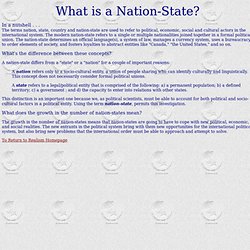
In a nutshell . . . The terms nation, state, country and nation-state are used to refer to political, economic, social and cultural actors in the international system. The modern nation-state refers to a single or multiple nationalities joined together in a formal political union. The nation-state determines an official language(s), a system of law, manages a currency system, uses a bureaucracy to order elements of society, and fosters loyalties to abstract entities like "Canada," "the United States," and so on.
The Formation of Modern Nation States Video - Lesson and Example. Europe Prior to the 1500s In today's modern world, the idea of nations and nationalities is widely understood.
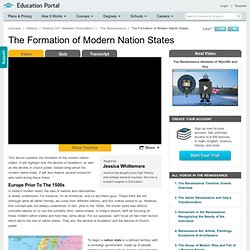
For instance, I'm an American, and so are these guys. These folks are not. Although we're all rather friendly, we come from different nations, and this makes sense to us. However, this concept was not always understood. British values: article by David Cameron. This week there has been a big debate about British values following the Trojan Horse controversy in some Birmingham schools – about what these values are, and the role they should play in education.

The values I’m talking about – a belief in freedom, tolerance of others, accepting personal and social responsibility, respecting and upholding the rule of law – are the things we should try to live by every day. To me they’re as British as the Union Flag, as football, as fish and chips. Of course, people will say that these values are vital to other people in other countries. And, of course, they’re right.
But what sets Britain apart are the traditions and history that anchors them and allows them to continue to flourish and develop. Our freedom doesn’t come from thin air. These are the institutions that help to enforce our values, keep them in check and make sure they apply to everyone equally. The question is: should we actively promote this? Now is the time to demonstrate confidence.